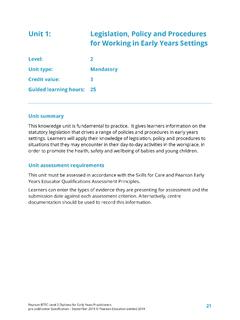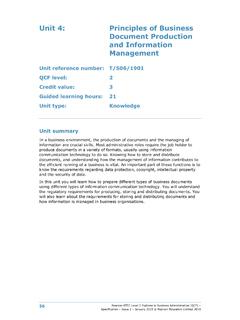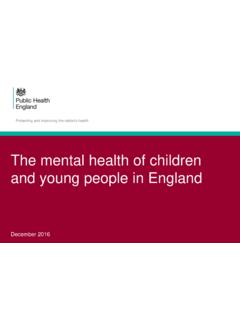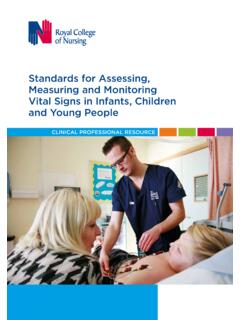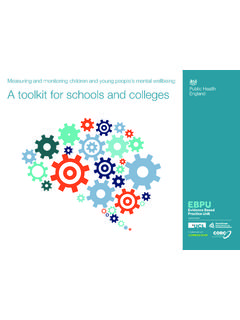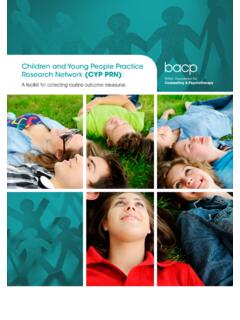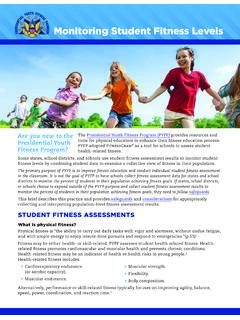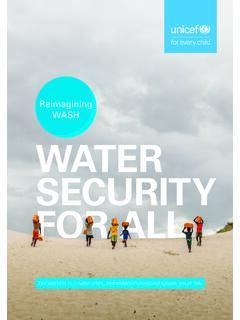Transcription of Unit 16: Participate in Teams to Benefit Children and ...
1 Unit 16: Participate in Teams to Benefit Children and young people in Residential Childcare Unit reference number: F/506/7605. QCF level: 3. Credit value: 3. Guided learning hours: 20. Unit summary This unit covers the topic of working effectively within a team and to enable the learner to understand the importance of multiagency working. In this unit, you will gain knowledge and understanding relating to how to work as part of a team , the local network for Children and young people 's services and the role of networks and multi-agency work in supporting positive outcomes for Children and young people in residential childcare. This includes the practices that support effective team working, the functions of agencies that make up the local network which is involved with Children and young people and the Benefit of networks and multi-agency work in supporting positive outcomes for Children and young people . You will be able to build working relationships with others who are involved in the care of Children and young people , overcoming barriers to partnership working and reflecting on your own practice in building and maintaining working relationships.
2 You will also Participate in a multi-agency team around a child or young person and communicate with others in order to facilitate multi-agency working. Additional information people involved Colleagues Organisational managers and supervisors Official visitors inspectorate Other visitors Colleagues from other agencies and services External partners A team around a child or young person is a multi-agency team assembled for a specific purpose and period of time Pearson BTEC Level 3 Diploma for Residential Childcare (England) (QCF) 151. Specification Issue 1 May 2015 Pearson Education Limited 2015. Parameters objectives actions plans roles and responsibilities arrangements for communication, decision making and measuring progress Appropriate communication use of electronic communication aids use of pictorial and design communication aids such as Makaton use of an interpreter when appropriate including British/Irish Sign Language interpreters effective use of the telephone preparing and delivering presentations written communication notes of meetings personal records presentations letters formal reports email 152 Pearson BTEC Level 3 Diploma for Residential Childcare (England) (QCF).
3 Specification Issue 1 May 2015 Pearson Education Limited 2015. Learning outcomes and assessment criteria To pass this unit, the learner needs to demonstrate that they can meet all the learning outcomes for the unit. The assessment criteria outline the requirements the learner is expected to meet to achieve the unit. Learning outcomes Assessment criteria 1 Understand how to work as part of Explain the practices that support a team effective team working Define the roles and responsibilities of different team members in own work setting Describe ways to ensure that own responsibilities as a team member are met 2 Understand the local network for Describe the functions of agencies Children and young people 's that constitute the local network services involved with Children and young people in residential childcare Explain how and why referrals are made between agencies 3 Understand the role of networks Analyse the benefits of networks and multi-agency work in and multi-agency work in supporting positive outcomes for supporting positive outcomes for Children and young people in Children and young people in residential childcare residential childcare Describe how failures in networks and multi-agency work have been highlighted
4 In formal inquiries and serious case reviews Describe circumstances when it would be desirable to use networks to build a multi-agency team around a child or young person 4 Be able to build working Build and maintain working relationships with others involved relationships with others within and in the care of Children and young beyond the work setting people Overcome barriers to partnership working Reflect on own practice in building and maintaining working relationships Identify where improvements can be made in own practice to support working relationships Pearson BTEC Level 3 Diploma for Residential Childcare (England) (QCF) 153. Specification Issue 1 May 2015 Pearson Education Limited 2015. Learning outcomes Assessment criteria 5 Be able to Participate in a multi- Participate in negotiating agency team around a child or agreement on the parameters of a young person team built around a child or young person Adapt own role and working practice to take account of responsibilities as a team member Work collaboratively with other team members within agreed boundaries while ensuring the child or young person remains the focus of the team Support the child or young person to understand the work of the team according to their level of understanding 6 Be able to communicate with others Use appropriate communication for to facilitate multi-agency working different circumstances in multi- agency working Explain the tensions between maintaining confidentiality and the need to share information with other agencies Prepare reports that meet legal requirements and are accurate.
5 Legible and concise Use information in reports prepared by other agencies to support multi- agency working Explain the value of using information prepared by other agencies 154 Pearson BTEC Level 3 Diploma for Residential Childcare (England) (QCF) . Specification Issue 1 May 2015 Pearson Education Limited 2015. Unit amplification 1 Understand how to work as part of a team Practices that support effective team work: characteristics of Teams ; team member types; roles within a team ; communication; individual contributions;. sharing knowledge; positive working relationships; sharing responsibility;. understanding aims and objectives; shared values; positive environment;. flexibility Roles and responsibilities of different team members in own work setting: job titles and role descriptions within work setting managers; deputy managers; shift leaders; support workers; social workers; domestic staff;. qualifications; skills; experience; support of child or young person in physical, social and emotional well-being; support access to education; support links to local networks and agencies; act as advocacy or provide access to an advocate.
6 Promote self-reliance and independence Ways to ensure that own responsibilities as a team member are met: policy and procedures; communication; information gathering; resources; time management; knowledge; training; supervision; physical and mental health 2 Understand the local network for Children and young people 's services The functions of agencies that constitute the local network involved with the Children and young people in residential care: external agencies as applicable to own setting and home country local education authority; Ofsted; social services; early years and childcare; play work; youth justice; police; further education; youth work; NHS and health services; sports and culture sector organisations; function of external agencies as applicable to own organisation How and why referrals are made between agencies: original aims and objectives have been met and a different support is required; specialist support is required; health; education; social development; meeting cultural needs.
7 Improving outcomes for Children and young people ; problem solving; knowing and respecting preference of child, young person or family 3 Understand the role of networks and multi-agency work in supporting positive outcomes for Children and young people in residential childcare Analyse the benefits of networks and multi-agency work in supporting positive outcomes for Children and young people in residential care: agencies working together in an integrated way; improving quality of assessments; improving outcomes; secure positive safeguarding outcomes; joint decision making; co- ordinated interventions; effective sharing of information; accurate assessment of risk and need; promoting welfare; range of skills and knowledge; supporting whole family unit How failures in networks and multi-agency work have been highlighted in formal inquiries and serious case reviews; quality in cross boarder communication;. sharing of information and issues of confidentiality; recording of information.
8 Absence of common thresholds of intervention; tracking systems during child transitions; Individual Management Review (IMR); quality of assessments;. Pearson BTEC Level 3 Diploma for Residential Childcare (England) (QCF) 155. Specification Issue 1 May 2015 Pearson Education Limited 2015. quality of services; inadequate training; recruitment and retention of quality staff; lack of capacity within agencies; limited resources; monitoring performance Circumstances when it would be desirable to use networks to build multi-agency team around a child or young person: to combine knowledge and skills to offer a co-ordinated support plan to Children , young people and families; education for Children who have been excluded or require addition support; physical and mental health issues; pregnancy; speech and language; youth offending;. housing; independent living 156 Pearson BTEC Level 3 Diploma for Residential Childcare (England) (QCF).
9 Specification Issue 1 May 2015 Pearson Education Limited 2015. Information for tutors Suggested resources Books Fulcher L et al Residential Child Care in Practice: Making a Difference (Social Work in Practice Series) (Policy Press, 2013) ISBN 9781847423108. Siraj-Blatchford I, Clarke K, Needham M The team Around the Child: Multi-Agency Working in the Early Years (Trentham Books, 2008). ISBN 9781858564180. Websites the community care website provides news, practice information and opinion on various aspects of social care, including Children and families social work and social care the government services and information website, which includes guidance on the multi-agency working and information sharing project, including the Final Report 2014. the website of the NSPCC, which provides various resources, including on the subject of serious case reviews the website of Plymouth City Council, which provides resources relating to the Children and young people 's partnership, including national common assessment framework for practitioners national guidance Assessment This unit is internally assessed.
10 To pass this unit the evidence that the learner presents for assessment must demonstrate that they have met the required standard specified in the learning outcomes and assessment criteria and the requirements of the assessment strategy. To ensure that the assessment tasks and activities enable learners to produce valid, sufficient, authentic and appropriate evidence that meet the assessment criteria, centres should apply the Unit assessment guidance provided and the requirements of the assessment strategy given below. Wherever possible, centres should adopt an holistic approach to assessing the units in the qualification. This gives the assessment process greater rigour and minimises repetition, time and the burden of assessment on all parties involved in the process. Unit assessment requirements This unit needs to be assessed in line with the Skills for Care & Development QCF. Assessment Principles, in Annexe A.






